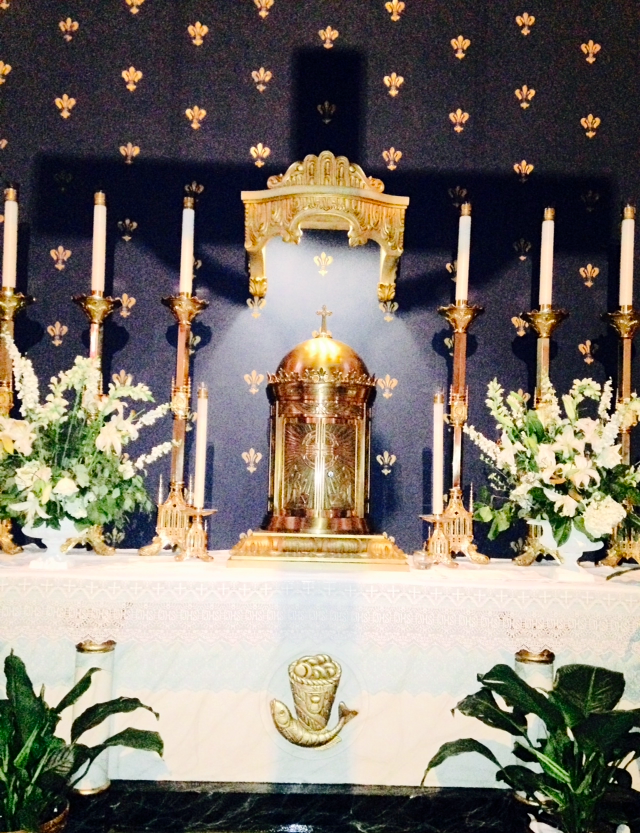With all of the Bread of Life readings this month, I thought a repeat of this blog would be timely. I'm in beautiful Wyoming this weekend for a retreat. Please pray for me! Happy Feast of the Queenship of Mary! Blessings and grace, Judy
Jesus said to them, “Amen, amen I say to you, unless you eat the flesh of the Son of Man and drink his blood, you do not have life within you” (John 6: 53). The readings about the Eucharist over the past weeks have jolted forward a memory of a conversation I had more than fifteen years ago. It was with my friend Cecil, who was an evangelical Protestant at the time. We were deeply engaged in a dialogue about whether the Catholic faith was “true” when the subject of the Eucharist came up.
“Christ’s teaching about receiving His flesh and blood was meant to be symbolic,” Cecil maintained. “He said ‘unless you eat my flesh and drink my blood you have no life in you,’” she went on. “If that was literal, where does that leave me and the rest of Christians who don’t receive the Eucharist?”
“That’s a good question,” I offered back. “Where does that leave you?”
I can still see the look of consternation on Cecil’s face, and I could tell that she was pondering the question seriously. So seriously that she went back and reread everything the Bible has to say about the subject. Particularly compelling during that review was the fact that “many of his disciples” parted ways with Jesus over His insistence that they had to eat His flesh and drink His blood. Plus the fact that He didn’t chase after them saying: “I was speaking in parables, guys! Come back!” Instead, He upped the ante for the ones who remained, saying: “Do you also want to leave?” (John 6:67).
The shock of Christ’s teaching on the Eucharist would prove to be a hinge that turned Cecil toward the Catholic Church—a hinge that ultimately led her to enter the Church in the year 2000, where she received Holy Communion for the very first time. It was impossible to deny that Jesus meant what He said about His flesh and blood literally, or that that’s the way His disciples and the early Church understood it.
I am convinced that one of Satan’s most ingenious strategies ever was to disengage half of the Body of Christ from “the Body of Christ.” The “source and summit of the Christian life,”* the Eucharist intimately unites us to Jesus Christ, preserving, increasing and renewing the life of grace in us.* Moreover, the Eucharist strengthens us in God’s love and roots us deeply in Jesus Christ, so that when the storms of life come—and come they will—we remain steadfast in our faith. Buffeted, maybe. Shaken loose from the foundation, no.
I experienced this reality personally when my life imploded in 2008. And I saw it again recently in living color in the life of my friend Connie, whose sudden separation and impending divorce sent her whirling physically, emotionally and spiritually. I offered to go spend the weekend with her to lend support, and I was honestly fretting over what to say in the face of so much pain. It was when she asked, “How did you survive all of the things you’ve been through?” that the one and only thing that needed to be said flowed seamlessly from my lips.
“I’d be dead without the Eucharist,” I stated pointedly. And I meant it. I firmly believe that what sustained me during that intense period of crisis was the fact that I had spent twenty-five years as a daily communicant. “Make the Eucharist your life, Connie,” I advised. “Make the Eucharist your life.”
A light came on in that reminder to my friend who was trying to regain her footing, and Connie’s hardly missed a day at Mass or Adoration since. The change in her has been dramatic and noticeable, and it’s apparent that her feet are back on solid ground as she moves into an unknown future.
“Where does that leave me?” so many of us have asked in moments of great trial like death, divorce and other life shattering events. It leaves us utterly dependent on His provision for us, standing squarely on the promise that in and through the Eucharist, He remains in us, and we in Him (John 6:56).
The Eucharist is no mere symbol—it is not just “empty calories” in the smorgasbord of the spiritual life. It is life itself, Christ Himself, waiting and wanting to feed us. The Eucharist is creation, redemption and sanctification all rolled into one. It is a lifeline to the eternal which effects communion with Christ that holds us together until we, at last, are held by Him.
* Catechism of the Catholic Church, par. 1324
* Catechism of the Catholic Church, par. 1391-1392

